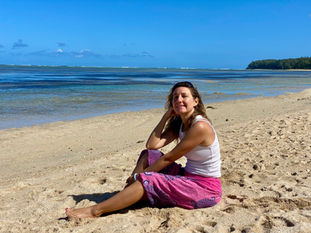
Sustainable Tourism in Mauritius: What It Means & Why It Matters
May 16, 2025
5 min read
0
0

Introduction
Mauritius may be a dream destination, but how we explore it matters more than ever.
As the travel industry offers more access to remote corners of the planet, the need for conscious tourism has never been greater. The world’s most sensitive ecosystems, endangered habitats, and diverse cultures are yours to explore—but I encourage you to do so responsibly, ensuring your journey leaves a positive impact on the environment and local communities.
After living in Mauritius for three months, I’ve observed that despite various sustainable tourism initiatives led by Mauritian authorities, many businesses are more focused on short-term gains than long-term preservation. From snorkeling tours to dolphin swims and guided hikes, nature is being monetized—but rarely protected. If you pay, you can do just about anything, regardless of the impact.
Still, it’s not all bad. The country is making strides. Eco-tourism programs are in place to protect coral reefs, reduce hotel food waste, and keep public spaces clean. The road to a truly sustainable Mauritius is still long—but there’s hope.
Section 1: What Is Sustainable Tourism?
Sustainable tourism or sustainable travel is a responsible and ethical approach to travel that minimizes environmental damage, supports local economies, and respects cultural heritage.
As defined by the UN World Tourism Organization:
“Tourism that takes full account of its current and future economic, social and environmental impacts, addressing the needs of visitors, the industry, the environment and host communities.”
For travelers, it means choosing experiences that create value—not harm. Supporting eco-conscious initiatives, reducing plastic use, staying in green-certified accommodation, and prioritizing local culture are just a few ways we can shift tourism toward something more meaningful.
Section 2: What Mauritius Is Doing
🌊 Protecting Marine Life & Coral Reefs
Mauritius has signed the BBNJ Treaty (Biodiversity Beyond National Jurisdiction), aligning with international commitments to ocean protection. Yet the reality on the ground is complex. Many local families rely on the ocean for income—from fishing to water-based tourism activities.
The average monthly wage in Mauritius is around 26,000 rupees (~515 euros), which makes it unsurprising that unsustainable fishing practices persist. Techniques like trawling and dynamite fishing are still used, damaging marine ecosystems and depleting fish populations—harming both biodiversity and the livelihoods of future generations.
Oil spills and pollution from unregulated water sports also threaten coral health. Live coral cover has dropped dramatically—from 49% in 2002 to just 18% in 2014. Today, 40–50% of remaining corals are partially or fully bleached. This loss not only affects marine life but increases storm surge vulnerability due to weakened coastal defenses.

🗑️ Waste & Public Space Management
Waste management efforts are inconsistent. Hotel beaches are maintained meticulously, while public beaches are often neglected. Some regions clean up Filao needles but leave plastic waste untouched. Sadly, littering is a visible and growing problem.
☀️ Renewable Energy Goals
Mauritius has committed to reaching 60% renewable energy in its electricity mix by 2030, up from a previous goal of 40%. As part of a larger sustainability plan, this initiative also aims to:
Phase out coal and reduce carbon emissions by 40%.
Launch 11 facility-scale projects totaling 200 MW.
Deploy 10,000 solar kits for vulnerable households.
Invest in battery storage to stabilize intermittent supply.
Support green financing through a MUR 2 billion bond for 13 new solar farms.
These initiatives aim not only to reduce the country’s environmental footprint but to create over 7,000 green jobs and enhance long-term energy security.

🧭 Small Steps: Eco-Guides & Community Tourism
Grassroots efforts are emerging—some local guides now offer conservation-focused hikes, while NGOs support coral planting, wildlife rehabilitation, and sustainable farming. These community-based eco-tourism initiatives deserve support and visibility.
Section 3: What It Means for Travelers
Tourism in Mauritius is booming—with over 1.3 million visitors annually, nearly matching the island’s population. But much of the revenue is captured by all-inclusive hotel chains, leaving small local businesses struggling to benefit.
🏨 Environmental Impacts of Hotels in Mauritius
Hotels—especially large resorts—can have significant environmental effects:
High water usage (for landscaping, pools, and guest amenities).
Heavy energy consumption, often from non-renewable sources.
Massive waste generation, including single-use plastics.
Marine damage, from construction runoff and untreated sewage.
Land strain, displacing natural habitats and stressing infrastructure.
Some resorts are making efforts: water-saving tech, banning plastic straws, composting food waste, and seeking eco-certifications. But many still prioritize volume and convenience over sustainability.
🌿 How You Can Make a Difference
If you’re planning to visit Mauritius, here are a few ways to tread lightly and travel consciously:
Stay in eco hotels or self-catered Airbnbs. By shopping locally, you support farmers, food vendors, and family-run cafés.
Dine at local beach shacks—affordable, fresh, and authentic.
Avoid buying bottled water. Bring a reusable bottle and a UV water filter to safely purify tap water.
Use the Dodo taxi app or flag a street taxi—compare prices and negotiate fairly.
Find local guides through FB groups instead of booking through hotels or international operators.
Say no to wildlife harassment. Don't ride turtles or touch coral. Don’t allow children to catch reef fish for entertainment.
Pick up litter when you see it—especially plastic. Every piece counts.
Respect the land and ocean. Stay on trails, don’t feed wild animals, and follow local signs.
Conclusion: A Shared Responsibility
After three months here, I’ve learned that the responsibility doesn’t fall solely on tourists. Authorities must invest in environmental education, law enforcement, and community empowerment. When locals understand the long-term impact of harmful practices, they’re better equipped to protect their land and push back when tourists cross the line.
Yes, we still have a long way to go. But I believe in the shift that’s happening—slowly but surely. As eco-travel and conscious tourism continue to trend on social media, the next generation will have stronger tools, deeper awareness, and more power to preserve places like Mauritius.
So when you visit, come with an open heart and a light footprint. 🌍
Eco-Accommodation Recommendations (External Links)
Looking to travel more consciously? Explore these eco-accommodation options in Mauritius that prioritize sustainability, community, and nature-first experiences.
Through this website you can find and book eco-friendly accomodation: https://mauritiushotels.mu/eco-friendly-lodges-guesthouse-mauritius.html
This page gives insights and reviews on the eco accomodations in Mauritius https://relocatemauritius.com/top-eco-lodges-in-mauritius/
For the 11 best nature lodges in Mauritius check out this page
https://www.voyageilemaurice.com/en/nature-lodge-mauritius/
📚 Sources & Further Reading (Citations)
Sources used in this article: The insights and facts shared in this blog are drawn from trusted environmental and tourism organizations, as well as recent research on sustainable travel trends.
https://www.wayfairertravel.com/inspiration/what-is-sustainable-travel/
https://sustainabletourismunit.mu/wp-content/uploads/2019/06/sus-Island_brochure.pdf
🔗 More From the Blog (Internal Links)
If you enjoyed this post, you might also like:
Why Slow Travel in Mauritius Is Worth It– A deeper dive into mindful travel experiences on the island
How We Afford to Travel in Our 40s (and on a Budget!) – This blog related to our personal experience.
📝 Disclaimer
This blog post is not sponsored, and I do not receive any commission or compensation from the links shared. All recommendations are based on personal research and aligned with the values of sustainable and responsible travel.














